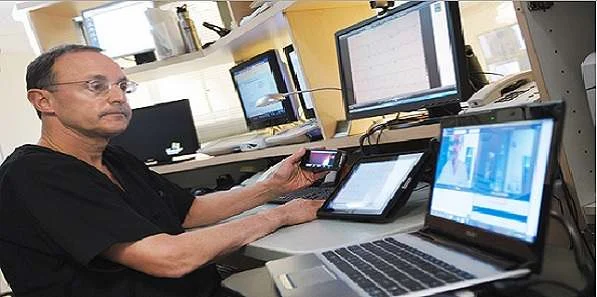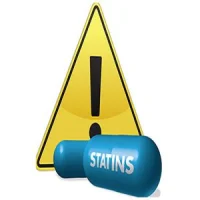CodeHeart, a mobile app developed at MedStar Heart & Vascular Institute at MedStar Washington Hospital Center, allows heart attack patients to be treated more quickly (some an average of 30 percent faster) reducing potential heart damage, according to a new study reported in the journal Cardiovascular Revascularization Medicine.
The app allows hospital interventional cardiologists to securely view a patient’s condition in real time, while simultaneously speaking with a physician at an emergency department that is referring the patient for further treatment. In addition, CodeHeart allows physicians to view a live, secured video feed containing vital signs and test results, such as electrocardiograms. Previously, those test results were faxed, a process that could take 10 minutes or more – one example of how time savings were achieved.
The study found that using CodeHeart improved results for a key measure of the effectiveness of the treatment of heart attack patients with ST-segment elevation myocardial infarction. The measure, called door-to-balloon time, tracks the time from a patient’s arrival at the hospital to the time he/she receives intervention, such as angioplasty, which uses a balloon to open up a blocked blood vessel. The longer the door-to-balloon time, the greater the chances of damage to the heart muscle.
In cases where CodeHeart was used, door-to-balloon time was reduced from 149 minutes to 103 minutes, according to the study.
As a patient is in transit, the hospital team can guide first responders on interim care, as well as mobilise and prepare teams for treatment once the patient arrives, saving time. “When it comes to treating a patient who appears to be suffering from chest pain or other heart attack symptoms, every second counts,” said Lowell F. Satler, MD, director of Cardiac Catheterization Laboratory at MedStar Heart & Vascular Institute. “CodeHeart helps us provide optimal care as quickly as possible and effectively treat every heart patient who comes to our facility.”
CodeHeart has been in use for several years at MedStar Heart & Vascular Institute, which serves patients from hundreds of miles around Washington. The application was developed by Dr. Satler, through collaboration first with AT&T™ and now with Vidyo. Currently, the app is being used at 10 area hospitals which refer patients to MedStar Heart & Vascular Institute.
“This is an exciting advancement for MedStar Heart & Vascular Institute and our community,” said Dr. Satler who is the study’s co-author. “Through technology like this, we are able to save more lives and achieve faster treatment times than we could have imagined five or 10 years ago.”
Source: MedStar Washington Hospital Center
Image Credit: MedStar Washington Hospital Center
The app allows hospital interventional cardiologists to securely view a patient’s condition in real time, while simultaneously speaking with a physician at an emergency department that is referring the patient for further treatment. In addition, CodeHeart allows physicians to view a live, secured video feed containing vital signs and test results, such as electrocardiograms. Previously, those test results were faxed, a process that could take 10 minutes or more – one example of how time savings were achieved.
The study found that using CodeHeart improved results for a key measure of the effectiveness of the treatment of heart attack patients with ST-segment elevation myocardial infarction. The measure, called door-to-balloon time, tracks the time from a patient’s arrival at the hospital to the time he/she receives intervention, such as angioplasty, which uses a balloon to open up a blocked blood vessel. The longer the door-to-balloon time, the greater the chances of damage to the heart muscle.
In cases where CodeHeart was used, door-to-balloon time was reduced from 149 minutes to 103 minutes, according to the study.
As a patient is in transit, the hospital team can guide first responders on interim care, as well as mobilise and prepare teams for treatment once the patient arrives, saving time. “When it comes to treating a patient who appears to be suffering from chest pain or other heart attack symptoms, every second counts,” said Lowell F. Satler, MD, director of Cardiac Catheterization Laboratory at MedStar Heart & Vascular Institute. “CodeHeart helps us provide optimal care as quickly as possible and effectively treat every heart patient who comes to our facility.”
CodeHeart has been in use for several years at MedStar Heart & Vascular Institute, which serves patients from hundreds of miles around Washington. The application was developed by Dr. Satler, through collaboration first with AT&T™ and now with Vidyo. Currently, the app is being used at 10 area hospitals which refer patients to MedStar Heart & Vascular Institute.
“This is an exciting advancement for MedStar Heart & Vascular Institute and our community,” said Dr. Satler who is the study’s co-author. “Through technology like this, we are able to save more lives and achieve faster treatment times than we could have imagined five or 10 years ago.”
Source: MedStar Washington Hospital Center
Image Credit: MedStar Washington Hospital Center
Latest Articles
heart attack, Angioplasty, myocardial infarction, electrocardiogram, mobile app
CodeHeart, a mobile app developed at MedStar Heart & Vascular Institute at MedStar Washington Hospital Center, allows heart attack patients to be treat...










